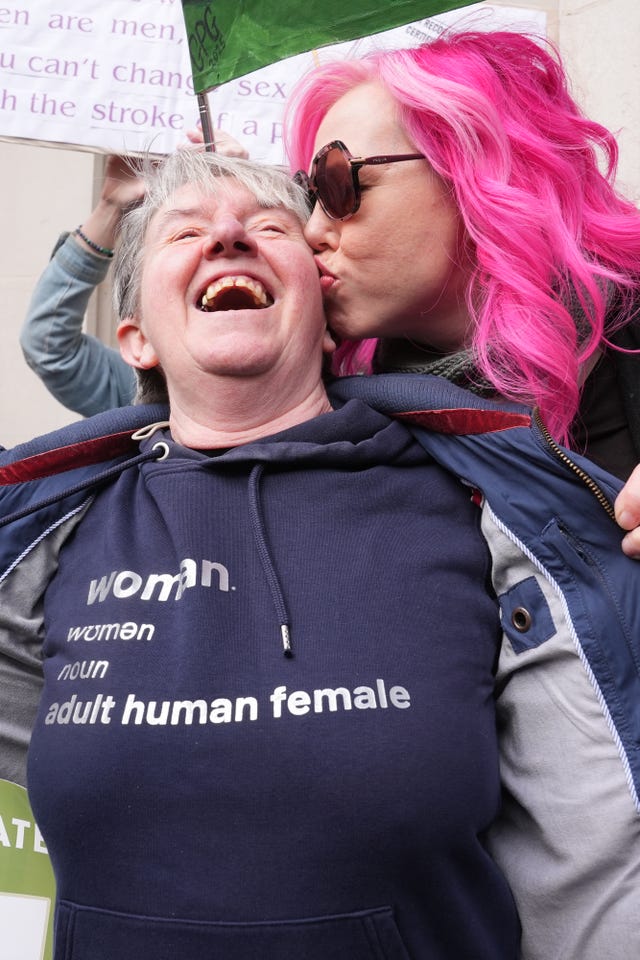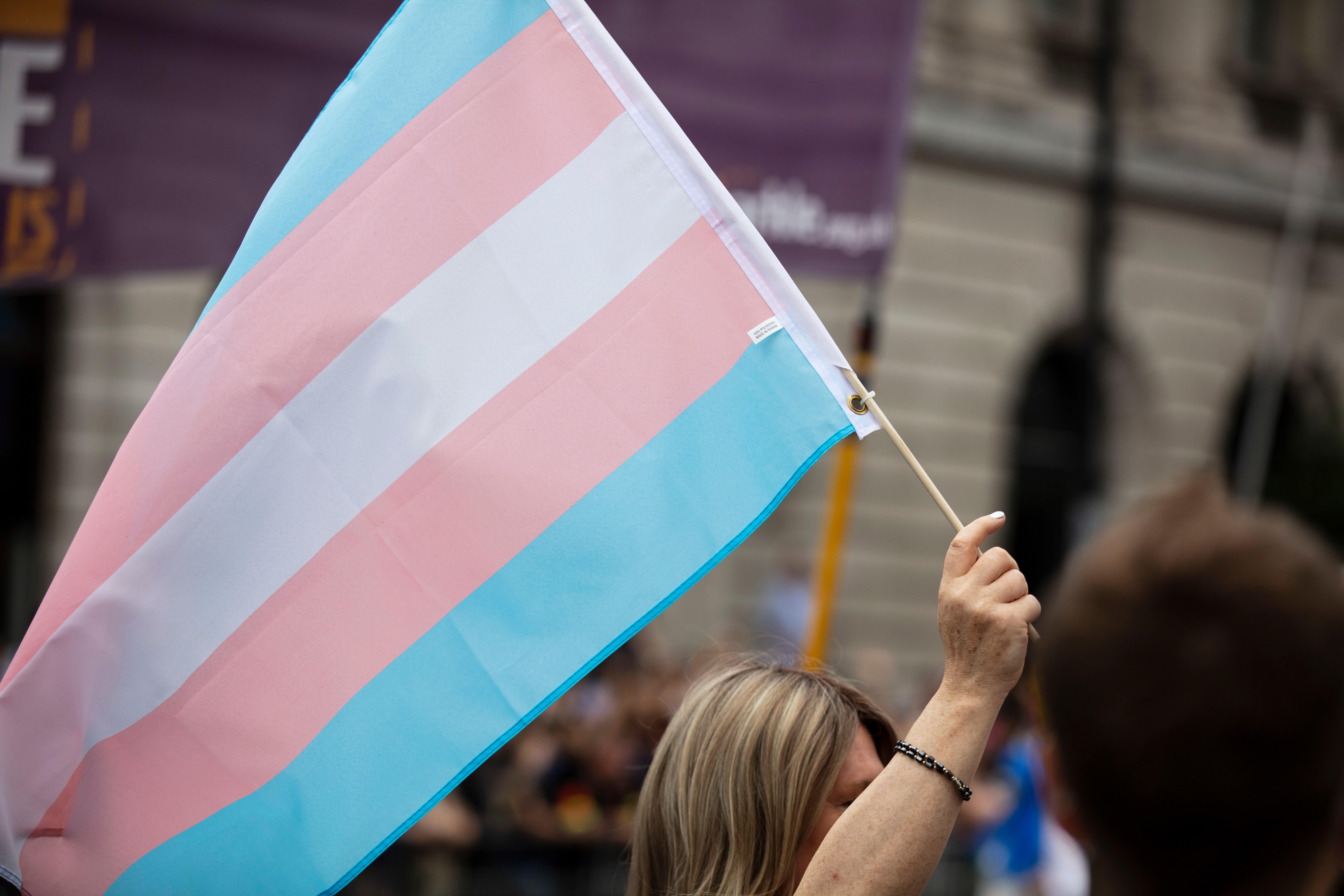Campaigners who brought the legal case have told of their delight but others raised concerns at the implications.
The UK’s highest court has unanimously ruled that the terms woman and sex in the Equality Act “refer to a biological woman and biological sex”.
Here, the PA news agency takes a look at what the ruling means and how campaigners and politicians have reacted.
– What was the case about?
The dispute centred on whether someone with a gender recognition certificate (GRC) recognising their gender as female should be treated as a woman under the UK 2010 Equality Act.
– What is a gender recognition certificate?
A person can apply for a certificate to have their affirmed or acquired gender legally recognised in the UK.
Obtaining a GRC requires a diagnosis of gender dysphoria, having lived in the acquired gender for at least two years and an intention to live in that gender for the rest of the applicant’s life.
– What did the court rule?
In a ruling on Wednesday, five justices at the UK’s highest court unanimously ruled that a GRC does not change a trans person’s legal sex under the Equality Act.
Delivering the judgment Lord Hodge said the “central question” is how the words “woman” and “sex” are defined in the 2010 legislation.
He continued: “The terms woman and sex in the Equality Act 2010 refer to a biological woman and biological sex.”
It took three extraordinary, tenacious Scottish women with an army behind them to get this case heard by the Supreme Court and, in winning, they’ve protected the rights of women and girls across the UK. @ForWomenScot, I’m so proud to know you 🏴💜🏴💚🏴🤍🏴 https://t.co/JEvcScVVGS
— J.K. Rowling (@jk_rowling) April 16, 2025
– What does the ruling mean?
Transgender women with a GRC can be excluded from single-sex spaces if “proportionate”.
The judges said while the word “biological” does not appear in the definition of man or woman in the Equality Act, “the ordinary meaning of those plain and unambiguous words corresponds with the biological characteristics that make an individual a man or a woman”.
The 88-page ruling stated that if the word “sex” did not only mean biological sex in the 2010 legislation, providers of single-sex spaces including changing rooms, homeless hostels and medical services would face “practical difficulties”.
Lord Hodge, Lady Rose and Lady Simler added: “Read fairly and in context, the provisions relating to single-sex services can only be interpreted by reference to biological sex.”
The justices also said that a different interpretation would have “rendered meaningless” part of the Equality Act dealing with protection from discrimination on the grounds of sexual orientation and could lead to an “inevitable loss of autonomy and dignity for lesbians” as well as impacting lesbian clubs and associations.
– What does this mean for the rights of trans people?
The judges said that this interpretation of the law does not cause disadvantage to trans people, who were described as a “potentially vulnerable group”.
They said transgender people are still protected from discrimination, and “would be able to invoke the provisions on direct discrimination and harassment, and indirect discrimination” if needed.
The justices also said that trans people are protected from discrimination on the grounds of gender reassignment.
– What have campaigners who brought and supported the legal challenge said?

Campaign group For Women Scotland (FWS), who took their case to the Supreme Court, said they were “absolutely jubilant” at the ruling.
Author JK Rowling, who has been outspoken on gender issues, said campaigners had “protected the rights of women and girls across the UK”.
She also said: “It took three extraordinary, tenacious Scottish women with an army behind them to get this case heard by the Supreme Court,” adding: “I’m so proud to know you.”
Campaign group Sex Matters said the court had given “the right answer: the protected characteristic of sex – male and female – refers to reality, not to paperwork”, while LGB Alliance said the ruling “marks a watershed for women” and is a “victory for biology, for common sense, for reality”.
– What have campaigners supporting trans people said?

LGBTQ+ charity Stonewall said there is “deep concern at the widespread implications” of the court ruling, which it said is “incredibly worrying for the trans community”.
Its chief executive Simon Blake said: “It’s important to be reminded the court strongly and clearly re-affirmed the Equality Act protects all trans people against discrimination, based on gender reassignment, and will continue to do so.”
He said Stonewall will “continue its work with the Government and parliamentarians to achieve equal rights under the law for LGBTQ+ people”.
Amnesty International UK described the ruling as “disappointing” with “potentially concerning consequences for trans people” but said it is “important to stress that the court has been clear that trans people are protected under the Equality Act against discrimination and harassment”.
– What have the Scottish and Westminster Governments said?
The UK Government said the ruling “brings clarity and confidence, for women and service providers such as hospitals, refuges, and sports clubs”.
A spokesman added: “Single-sex spaces are protected in law and will always be protected by this Government.”
Scotland’s First Minister said the Scottish Government accepts the ruling, adding that “protecting the rights of all” will inform its response.
In a post on X, John Swinney also said: “The ruling gives clarity between two relevant pieces of legislation passed at Westminster.
“We will now engage on the implications of the ruling.”
How did this case get to court?
The matter first came to court in 2022, when FWS successfully challenged the Gender Representation on Public Boards (Scotland) Act 2018 over its inclusion of trans women in its definition of women.
The Court of Session ruled that changing the definition of a woman in the act was unlawful, as it dealt with matters falling outside the Scottish Parliament’s legal competence.
Following the challenge, the Scottish Government dropped the definition from the act and issued revised statutory guidance – essentially, advice on how to comply with the law.
This stated that under the 2018 Act the definition of a woman was the same as that set out in the Equality Act 2010, and also that a person with a GRC recognising their gender as female had the sex of a woman.
FWS challenged this revised guidance on the grounds sex under the Equality Act referred to its biological meaning, and the Government was overstepping its powers by effectively redefining the meaning of “woman”.
However, its challenge was rejected by the Court of Session’s Outer House on December 13 2022.
The Inner House upheld that decision on November 1 2023 – but granted FWS permission to appeal to the UK Supreme Court.

